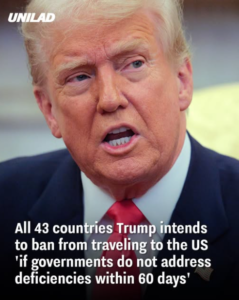In a significant policy shift, President Donald Trump’s administration has proposed new travel restrictions that could impact citizens from 43 countries. This initiative aims to enhance national security by addressing deficiencies in information sharing and vetting processes related to immigration. The countries are categorized into three distinct groups—red, orange, and yellow—each reflecting the severity of the proposed restrictions.
Red List: Complete Travel Ban
The “red” list comprises 11 countries whose citizens would be entirely barred from entering the United States:
- Afghanistan: Following the Taliban’s resurgence, concerns have escalated regarding the country’s stability and potential threats emanating from its territory.
- Bhutan: Despite its peaceful reputation, Bhutan’s inclusion is linked to perceived inadequacies in its information-sharing mechanisms.
- Cuba: Long-standing political tensions and concerns over intelligence activities have led to its inclusion.
- Iran: Accusations of state-sponsored terrorism and strained diplomatic relations contribute to its presence on the list.
- Libya: Ongoing civil unrest and the presence of militant groups raise security concerns.
- North Korea: Persistent geopolitical tensions and nuclear ambitions are primary factors.
- Somalia: The activities of extremist groups like Al-Shabaab and governmental instability are significant issues.
- Sudan: Historical ties to terrorist organizations and internal conflicts contribute to its inclusion.
- Syria: The prolonged civil war and the presence of various militant factions pose security risks.
- Venezuela: Political instability and concerns over criminal organizations influence its status.
- Yemen: The ongoing conflict and the operational presence of terrorist groups are major concerns.
Orange List: Partial Travel Restrictions
The “orange” list includes 10 countries whose citizens would face limited entry, primarily restricted to specific visa categories and subject to mandatory in-person interviews:
- Belarus: Political unrest and alignment with adversarial nations raise concerns.
- Eritrea: Human rights issues and lack of cooperation on security matters are significant factors.
- Haiti: Political instability and inadequate information-sharing mechanisms contribute to its inclusion.
- Laos: Concerns over governance and insufficient security protocols are noted.
- Myanmar: Recent political upheavals and human rights violations are primary considerations.
- Pakistan: Historical associations with militant groups and internal security challenges influence its status.
- Russia: Geopolitical tensions and cyber-security threats are significant factors.
- Sierra Leone: Governance issues and inadequate security measures contribute to its inclusion.
- South Sudan: Ongoing conflict and instability are primary concerns.
- Turkmenistan: Isolationist policies and lack of cooperation on security matters are noted.
Yellow List: Warning and Potential Future Restrictions
The “yellow” list consists of 22 countries that have been given a 60-day period to address identified deficiencies. Failure to comply may result in escalation to the red or orange lists:
- Angola: Concerns over document security and information sharing.
- Antigua and Barbuda: Issues related to citizenship-by-investment programs.
- Benin: Inadequate passport security measures.
- Burkina Faso: Rising extremist activities and border security concerns.
- Cambodia: Governance issues and insufficient security protocols.
- Cameroon: Internal conflicts and inadequate information sharing.
- Cape Verde: Concerns over document security.
- Chad: Terrorist activities and border security issues.
- Republic of Congo: Governance and security concerns.
- Democratic Republic of Congo: Ongoing conflicts and inadequate security measures.
- Dominica: Issues related to citizenship-by-investment programs.
- Equatorial Guinea: Governance issues and lack of cooperation on security matters.
- Gambia: Concerns over document security and information sharing.
- Liberia: Inadequate passport security measures.
- Malawi: Governance and security concerns.
- Mali: Rising extremist activities and border security concerns.
- Mauritania: Issues related to document security and information sharing.
- St. Kitts and Nevis: Concerns over citizenship-by-investment programs.
- St. Lucia: Issues related to document security.
- São Tomé and Príncipe: Inadequate security protocols.
- Vanuatu: Concerns over citizenship-by-investment programs.
- Zimbabwe: Governance issues and inadequate information sharing.
Implementation and Global Reactions
The proposed measures are part of President Trump’s broader strategy to enhance national security by tightening immigration controls. Countries on the yellow list have been given a 60-day window to rectify the identified deficiencies. Failure to do so could result in escalated restrictions. The international community has expressed varied reactions, with some nations criticizing the move as discriminatory, while others acknowledge the U.S.’s sovereign right to secure its borders.
Conclusion


